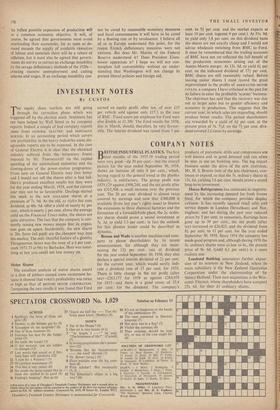INVESTMENT NOTES
By CUSTOS
Fr HE equity share markets are still going 1 through the correction phase which was triggered off by the election scare. Sentiment has not been helped by Wall Street or by company reports. Indeed, a couple of bad company reports came from GENERAL ELECTRIC and MONTAGUE BURTON. In an accounting period which covers low profitability in the heavy industries some dis- agreeable reports are to be expected. In the case of General, Electric it is clear that the electrical industry suffered from the temporary freeze imposed by Mr. Thorneycroft on the capital spending of the nationalised industries and the slowing-down of the power-station programme. From now on General Electric may fare better and I would not sell the shares after a bad fall. DECCA produced excellent results but they were for the year ending March, 1958, and the current year may not be so favourable. Dealings started this week in the new GALLAHER shares at a premium of 7s. 9d. As the old, ex rights but cum dividend, at 40s. 3d. offer a yield of nearly 61 per cent., which is nearly 3 per cent. above the average yield on the Financial Times index, the shares are quite attractive. The fact that the company is con- stantly raising new money means that its expan, sion goes on apace. Incidentally, the new shares in 20s. form (nil paid) are the-cheapest way. into this market. The only cheerful feature of a globmy Throgmorton Street was the issue of a 6 per cent. stock 1971-73 at 981 by Barbados. Here was some- thing at last you could not lose money, on.
Motor Shares
The excellent analysis of motor shares issued 3 y a firm of jobbers caused some excitement be- cause it showed that FORD'S profitability was twice is high as that of BRITISH MOTOR CORPORATION. Comparing the two results it was found that Ford earned an equity profit, after tax, of over £35 per • vehicle sold against only £17.3 in the case of BMC. Fixed assets per employee for Ford were also double at £1,200. The Ford results for 1958, due in March, should, therefore, be very favour- able. The interim dividend was raised from 3 per least 10 per cent. (against 9 per cent.). At 51s. 9d. to yield only 3.8 per cent, on this dividend basis the shares are not exactly cheap and I would not advise wholesale switching from BMC to Ford. It must be remembered that the trading accounts of BMC have not yet reflected the full benefit of the production economies arising out of the Austin-Morris merger. At 13s. 9d. to yield 61 per cent. on the indicated dividend of 171 per cent. BMC shares are still reasonably valued. Before leaving motor shares I must record the great improvement in the profits of ASSOCIATED MOTOR CYCLES, a company I have criticised in the past for its failure to enter the profitable 'scooter' business. The chairman has said that the recovery was due not to larger sales but to greater efficiency and economy in production. This suggests that the current year, in which sales are expanding, should produce better results. The patient shareholders are rewarded by a yield of 6+ per cent, at the present price of 5s. 71d. on the 71 per cent. divi- dend covered 2.6 times by earnings.










































 Previous page
Previous page